| | ||||||||||||||||||||
| ||||||||||||||||||||
This lists parties that won seats. See the complete results below.
| ||||||||||||||||||||
Legislative elections were held in France on 21 June. Only citizens paying taxes were eligible to vote.
| | ||||||||||||||||||||
| ||||||||||||||||||||
This lists parties that won seats. See the complete results below.
| ||||||||||||||||||||
Legislative elections were held in France on 21 June. Only citizens paying taxes were eligible to vote.
 | ||||
|---|---|---|---|---|
| Party | Votes | % | Seats | |
| Conservative ministerial | 320 | |||
| Opposition | 75 | |||
| Third Party | 50 | |||
| Legitimists | 15 | |||
| Total | 460 | |||
| Total votes | 129,211 | – | ||
| Registered voters/turnout | 171,015 | 75.56 | ||
| Source: Roi et President | ||||
Louis-Philippe of France dissolved the legislature on 3 October 1837.

The French Revolution was a period of political and societal change in France that began with the Estates General of 1789, and ended with the coup of 18 Brumaire in November 1799 and the formation of the French Consulate. Many of its ideas are considered fundamental principles of liberal democracy, while its values and institutions remain central to modern French political discourse.

Louis XIV, also known as Louis the Great or the Sun King, was King of France from 1643 until his death in 1715. His verified reign of 72 years and 110 days is the longest of any sovereign. An emblematic character of the Age of Absolutism in Europe, Louis XIV's legacy is widely characterized by French colonial expansion, the conclusion of Eighty Years' War involving the Habsburgs, and his architectural bequest, marked by commissioned works of art and buildings. His pageantry, opulent lifestyle and ornate cultivated image earned him enduring admiration. Louis XIV raised France to be the exemplar nation-state of the early modern period, and established a cultural prestige which lasted through the subsequent centuries, and continues today.

Mauritius, officially the Republic of Mauritius, is an island country in the Indian Ocean, about 2,000 kilometres off the southeastern coast of East Africa, east of Madagascar. It includes the main island, as well as Rodrigues, Agaléga, and St. Brandon. The islands of Mauritius and Rodrigues, along with nearby Réunion, are part of the Mascarene Islands. The main island of Mauritius, where the population is concentrated, hosts the capital and largest city, Port Louis. The country spans 2,040 square kilometres (790 sq mi) and has an exclusive economic zone covering 2,300,000 square kilometres.

Paris is the capital and largest city of France. With an estimated population of 2,102,650 residents in January 2023 in an area of more than 105 km2 (41 sq mi), Paris is the fourth-most populous city in the European Union, the ninth-most populous city in Europe and the 30th most densely populated city in the world in 2022. Since the 17th century, Paris has been one of the world's major centres of finance, diplomacy, commerce, culture, fashion, and gastronomy. Because of its leading role in the arts and sciences and its early adaptation of extensive street lighting, it became known as the City of Light in the 19th century.
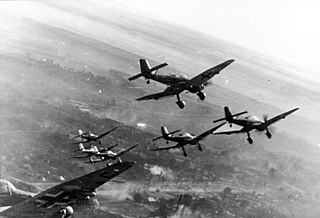
World War II or the Second World War was a global conflict between two coalitions: the Allies and the Axis powers. Nearly all the world's countries participated, with many investing all available civilian resources in pursuit of total war. Tanks and aircraft played major roles, enabling the strategic bombing of cities and delivery of the only nuclear weapons ever used in war. World War II was the deadliest conflict in history, resulting in 70 to 85 million deaths, more than half of which were civilians. Millions died in genocides, including the Holocaust, and by massacres, starvation, and disease. After the Allied victory, Germany, Austria, Japan, and Korea were occupied, and German and Japanese leaders were tried for war crimes.

In the administrative divisions of France, the department is one of the three levels of government under the national level, between the administrative regions and the communes. There are ninety-six departments in metropolitan France, with an additional five overseas departments, which are also classified as overseas regions. Departments are further subdivided into 333 arrondissements and 2,054 cantons. These last two levels of government have no political autonomy, instead serving as the administrative basis for the local organisation of police, fire departments as well as, in certain cases, elections.

The French and Indian War (1754–1763) was a theater of the Seven Years' War, which pitted the North American colonies of the British Empire against those of the French, each side being supported by various Native American tribes. At the start of the war, the French colonies had a population of roughly 60,000 settlers, compared with 2 million in the British colonies. The outnumbered French particularly depended on their native allies.
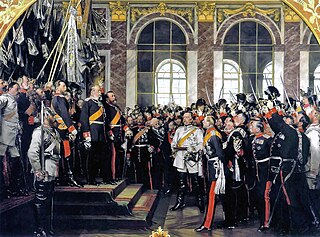
The Franco-Prussian War or Franco-German War, often referred to in France as the War of 1870, was a conflict between the Second French Empire and the North German Confederation led by the Kingdom of Prussia. Lasting from 19 July 1870 to 28 January 1871, the conflict was caused primarily by France's determination to reassert its dominant position in continental Europe, which appeared in question following the decisive Prussian victory over Austria in 1866. According to some historians, Prussian chancellor Otto von Bismarck deliberately provoked the French into declaring war on Prussia in order to induce four independent southern German states—Baden, Württemberg, Bavaria and Hesse-Darmstadt—to join the North German Confederation. Other historians contend that Bismarck exploited the circumstances as they unfolded. All agree that Bismarck recognized the potential for new German alliances, given the situation as a whole.

Marie Antoinette was the last Queen of France prior to the French Revolution and the establishment of the French First Republic. Marie Antoinette was the wife of Louis XVI. Born Archduchess Maria Antonia of Austria, she was the penultimate child and youngest daughter of Empress Maria Theresa and Emperor Francis I. She married Louis Auguste, Dauphin of France, in May 1770 at the age of 14. She then became the Dauphine of France. On 10 May 1774, her husband ascended the throne as Louis XVI and she became queen.

Louis XVI was the last king of France before the fall of the monarchy during the French Revolution. Louis XVI was the husband of Marie Antoinette.

The Ivory Coast, also known as Côte d'Ivoire and officially the Republic of Côte d'Ivoire, is a country on the southern coast of West Africa. Its capital city of Yamoussoukro is located in the centre of the country, while its largest city and economic centre is the port city of Abidjan. It borders Guinea to the northwest, Liberia to the west, Mali to the northwest, Burkina Faso to the northeast, Ghana to the east, and the Atlantic Ocean's Gulf of Guinea to the south. With 31.5 million inhabitants in 2024, Ivory Coast is the third-most populous country in West Africa. Its official language is French, and indigenous languages are also widely used, including Bété, Baoulé, Dyula, Dan, Anyin, and Cebaara Senufo. In total, there are around 78 languages spoken in Ivory Coast. The country has a religiously diverse population, including numerous followers of Islam, Christianity, and traditional faiths often entailing animism.

Napoleon III was President of France from 1848 to 1852 and then Emperor of the French from 1852 until his deposition in 1870. He was the first president, second emperor, and last monarch of France.

Napoleon Bonaparte, later known by his regnal name Napoleon I, was a French military officer and statesman who rose to prominence during the French Revolution and led a series of successful campaigns across Europe during the French Revolutionary and Napoleonic Wars from 1796 to 1815. He was the leader of the French Republic as First Consul from 1799 to 1804, then of the French Empire as Emperor of the French from 1804 to 1814, and briefly again in 1815.
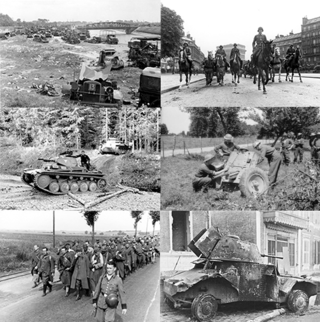
The Battle of France, also known as the Western Campaign, the French Campaign and the Fall of France, during the Second World War was the German invasion of the Low Countries and France. The invasion plan for the Low Countries and France was called Case Yellow. Fall Rot was planned to finish off the French and British after the evacuation at Dunkirk. The Low Countries and France were defeated and occupied by Axis troops down to the Demarcation line. In November 1942, Wehrmacht troops also occupied Vichy France ending land operations on the Western Front until the Normandy landings began on 6 June 1944.
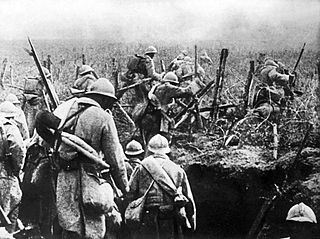
World War I or the First World War, also known as the Great War, was a global conflict between two coalitions: the Allies and the Central Powers. Fighting took place mainly in Europe and the Middle East, as well as in parts of Africa and the Asia-Pacific, and in Europe was characterised by trench warfare; the widespread use of artillery, machine guns, and chemical weapons (gas); and the introductions of tanks and aircraft. World War I was one of the deadliest conflicts in history, resulting in an estimated 10 million military dead and more than 20 million wounded, plus some 10 million civilian dead from causes including genocide. The movement of large numbers of people was a major factor in the deadly Spanish flu pandemic.

France, officially the French Republic, is a country located primarily in Western Europe. Its overseas regions and territories include French Guiana in South America, Saint Pierre and Miquelon in the North Atlantic, the French West Indies, and many islands in Oceania and the Indian Ocean, giving it one of the largest discontiguous exclusive economic zones in the world. Metropolitan France shares borders with Belgium and Luxembourg to the north, Germany to the northeast, Switzerland to the east, Italy and Monaco to the southeast, Andorra and Spain to the south, and a maritime border with the United Kingdom to the northwest. Its metropolitan area extends from the Rhine to the Atlantic Ocean and from the Mediterranean Sea to the English Channel and the North Sea. Its eighteen integral regions—five of which are overseas—span a combined area of 643,801 km2 (248,573 sq mi) and have a total population of nearly 68.4 million as of January 2024. France is a semi-presidential republic with its capital in Paris, the country's largest city and main cultural and economic centre.
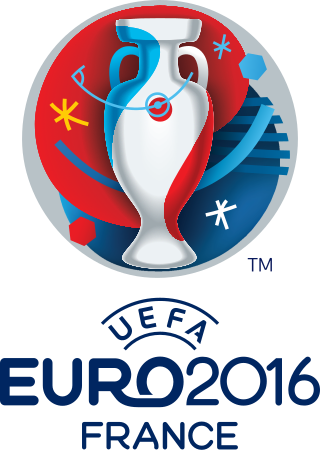
The 2016 UEFA European Football Championship, commonly referred to as UEFA Euro 2016 or simply Euro 2016, was the 15th UEFA European Championship, the quadrennial international men's football championship of Europe organised by UEFA. It was held in France from 10 June to 10 July 2016. Spain were the two-time defending champions, having won the 2008 and 2012 tournaments, but were eliminated in the round of 16 by Italy, Portugal won the tournament for the first time, following a 1–0 victory after extra time over the host team, France, in the final played at the Stade de France.
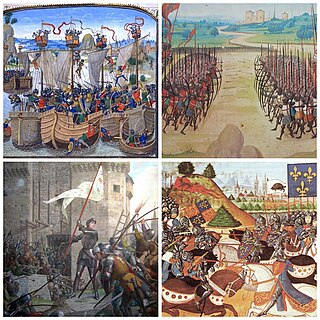
The Hundred Years' War was a conflict between the kingdoms of England and France and a civil war in France during the Late Middle Ages. It emerged from feudal disputes over the Duchy of Aquitaine and was triggered by a claim to the French throne made by Edward III of England. The war grew into a broader military, economic, and political struggle involving factions from across Western Europe, fuelled by emerging nationalism on both sides. The periodisation of the war typically charts it as taking place over 116 years. However, it was an intermittent conflict which was frequently interrupted by external factors, such as the Black Death, and several years of truces.

The Seven Years' War (1756–1763) was a global conflict involving most of the European great powers, fought primarily in Europe and the Americas. One of the opposing alliances was led by Great Britain and Prussia. The other alliance was led by France and Austria, backed by Spain, Saxony, Sweden, and Russia. The French and Indian War (1754–1763), the Anglo-Spanish War (1762–1763), and the Spanish–Portuguese War (1762–1763) were all parts of the Seven Years' War.

Vichy France, officially the French State, was a French rump state headed by Marshal Philippe Pétain during World War II, established after the French capitulation after the defeat against Germany. It was named after its seat of government, the city of Vichy. Officially independent, but with half of its territory occupied under the harsh terms of the 1940 armistice with Nazi Germany, it adopted a policy of collaboration. Though Paris was nominally its capital, the government established itself in the resort town of Vichy in the unoccupied "free zone", where it remained responsible for the civil administration of France as well as its colonies. The occupation of France by Germany at first affected only the northern and western portions of the country. In November 1942, the Allies occupied the French North Africa, and in response the Germans and Italians occupied the entire Metropolitan France, ending any pretence of independence by the Vichy government.